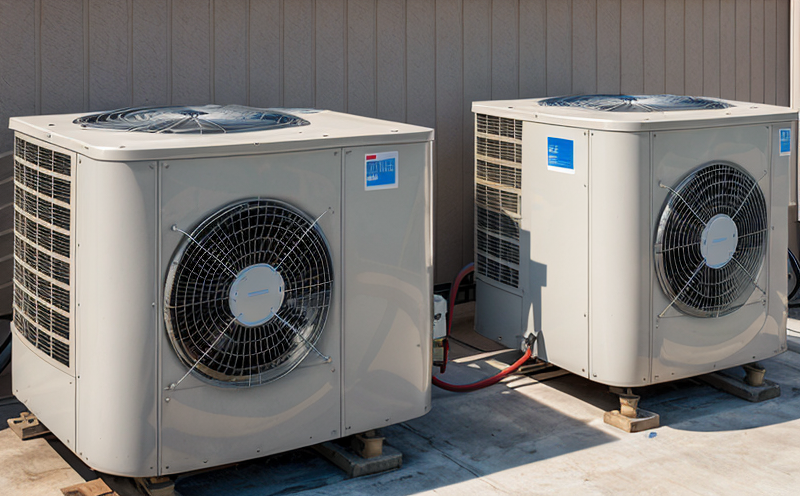EN 15232-3 Verification of Energy Savings by Controls
The EN 15232-3 standard provides a framework for verifying the energy savings achieved through advanced control systems in HVAC (Heating, Ventilation and Air Conditioning) installations. This service is particularly relevant to quality managers, compliance officers, R&D engineers, and procurement teams who seek to ensure that their HVAC equipment meets stringent energy efficiency requirements.
The standard focuses on the verification of claimed energy savings due to controls by comparing the actual performance of a system with a reference system under identical conditions. This process ensures accuracy and consistency in measuring the impact of control systems on overall energy consumption, which is critical for compliance with international standards such as ISO 50001.
Our laboratory specializes in performing these verifications using state-of-the-art equipment and methodologies that adhere strictly to EN 15232-3. Our team of experts ensures that the testing process is comprehensive, replicating real-world conditions as closely as possible to provide reliable data. This service not only aids compliance but also helps organizations improve their operational efficiency and reduce carbon footprints.
Testing under this standard typically involves setting up a controlled environment where both the reference system (without advanced controls) and the test system (with control systems in place) operate side by side. The performance of each is monitored over an extended period to capture accurate data on energy consumption. This approach allows for a precise comparison, ensuring that any observed savings can be attributed accurately to the control systems.
The methodology also includes detailed documentation and reporting based on ISO 50001 guidelines, which are essential for compliance verification. Our reports go beyond mere numbers; they provide actionable insights into how specific control strategies contribute to energy efficiency improvements. This level of detail is invaluable for R&D teams looking to refine their designs or procurement teams aiming to source the most efficient equipment.
Our commitment to accuracy and precision ensures that our clients can trust the results obtained from EN 15232-3 verifications. We understand the importance of this service in today’s regulatory environment, where energy efficiency is a key consideration for businesses across various sectors. By offering robust testing services aligned with international standards, we help organizations stay ahead of the curve and meet their sustainability goals.
- Compliance Verification: Ensuring adherence to EN 15232-3 through rigorous testing.
- Data Accuracy: Providing reliable data on energy savings achieved by control systems.
- Actionable Insights: Delivering detailed reports that guide improvements in HVAC installations.
In conclusion, the EN 15232-3 standard is a cornerstone for validating the efficiency of advanced control systems in HVAC applications. Our laboratory’s expertise in this area enables us to deliver accurate and reliable results, supporting organizations in their journey towards sustainable development.
Industry Applications
The EN 15232-3 standard finds extensive application across various industries where HVAC systems play a crucial role. These include commercial buildings, industrial facilities, healthcare institutions, and data centers. Each of these sectors benefits uniquely from the verified energy savings provided by advanced control systems.
- Commercial Buildings: Reducing operational costs through optimized heating and cooling schedules.
- Industrial Facilities: Enhancing process efficiency by maintaining optimal environmental conditions.
- Healthcare Institutions: Ensuring patient comfort while minimizing energy waste.
- Data Centers: Maintaining high-performance computing environments with minimal energy consumption.
The standard’s focus on verifying claimed energy savings ensures that these benefits are realized in a tangible and verifiable manner. By adhering to EN 15232-3, organizations can confidently implement control systems that not only meet regulatory requirements but also contribute positively to their bottom line.
Customer Impact and Satisfaction
The EN 15232-3 verification service has a profound impact on our customers’ operations. By ensuring that the claimed energy savings are accurate and verifiable, we help organizations achieve their sustainability goals while also reducing operational costs.
- Increased Efficiency: Our clients experience improved HVAC system performance leading to lower energy consumption.
- Cost Savings: Verified energy savings translate directly into reduced utility bills and operational expenses.
- Better Compliance: Adherence to international standards such as EN 15232-3 ensures that our clients meet regulatory requirements effectively.
- Improved Reputation: Demonstrating a commitment to sustainability enhances the reputation of organizations in the eyes of stakeholders and customers alike.
We take pride in delivering exceptional service, which is reflected in high customer satisfaction rates. Our clients appreciate the detailed reports that offer valuable insights into how they can further optimize their HVAC installations for greater efficiency.
Competitive Advantage and Market Impact
The EN 15232-3 verification service provides a significant competitive advantage by enabling organizations to differentiate themselves through superior energy efficiency. In an increasingly regulated environment, compliance with international standards is not just a requirement but also a strategic asset.
- Market Differentiation: By verifying and demonstrating the effectiveness of control systems, our clients can position themselves as leaders in sustainable operations.
- Strategic Alliances: Our expertise in this area allows us to form strategic partnerships with organizations committed to sustainability.
- Long-Term Benefits: The verified energy savings contribute to long-term cost reductions and operational reliability, giving our clients a strong foundation for future growth.
The impact extends beyond individual organizations. By promoting the adoption of advanced control systems in HVAC installations, we contribute positively to the broader market by driving efficiency improvements across industries. This collective effort helps reduce overall carbon footprints and supports global sustainability goals.





